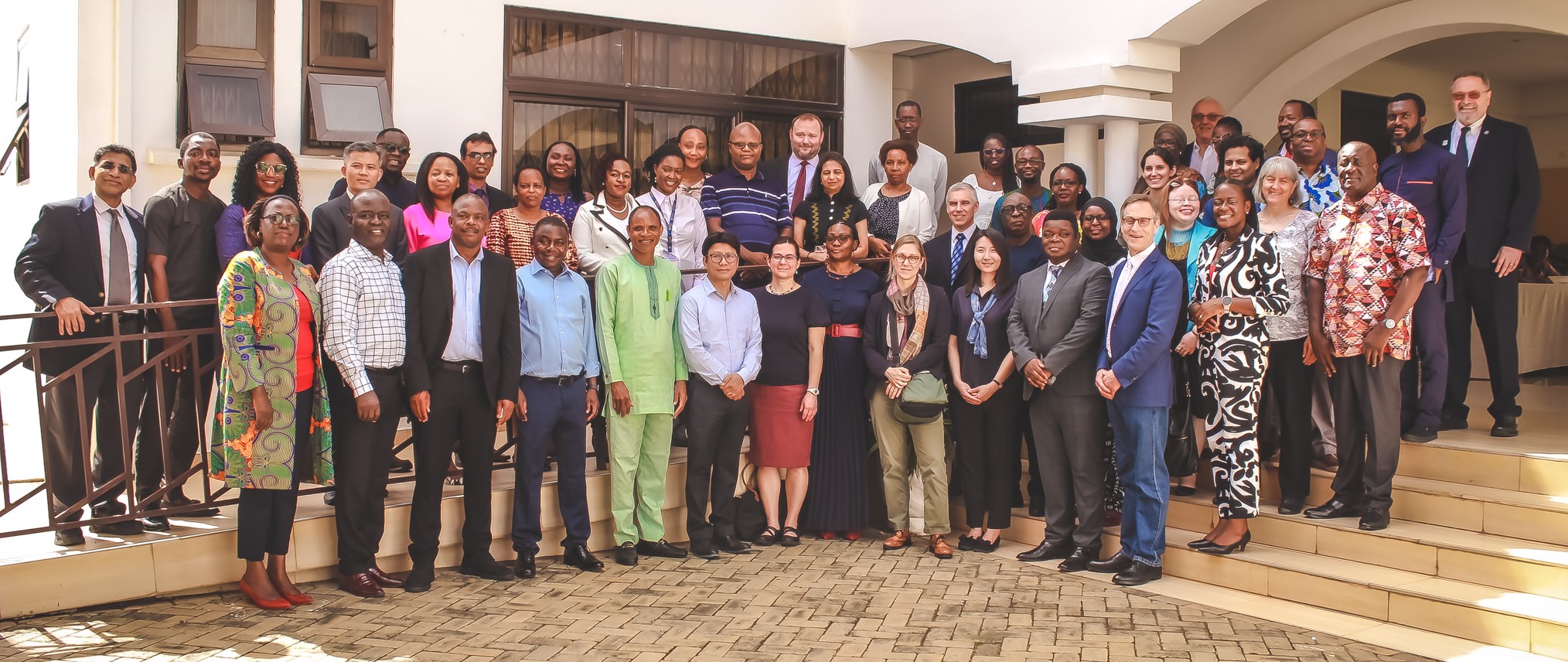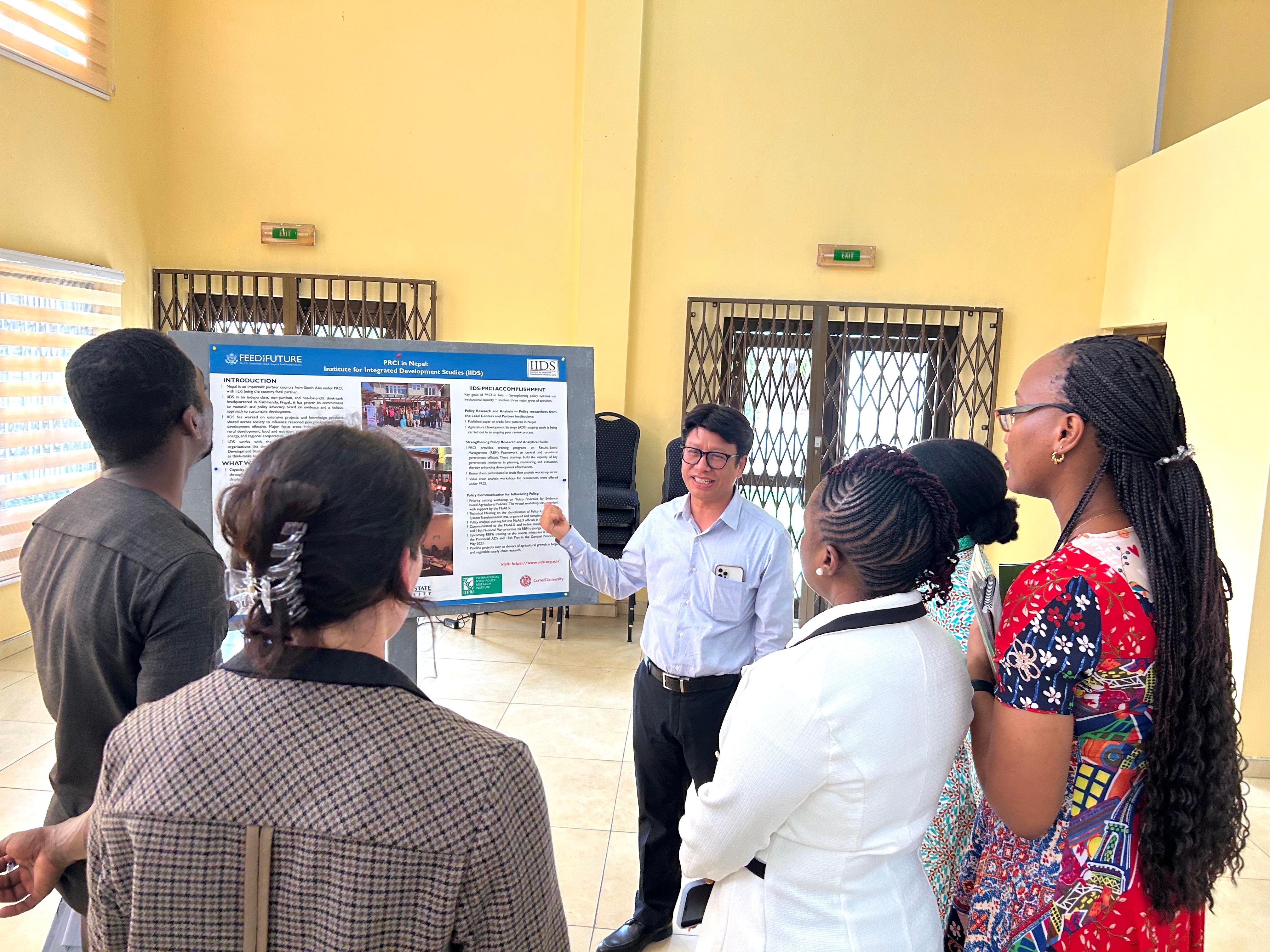PRCI Global Gathering celebrates its partnerships and looks to the future
PRCI Global Gathering takes stock of what has been done and how to build long term sustainability for the coalition of African and Asian research institutes
Accra, Ghana – The PRCI Global Gathering took place in Accra, Ghana, from April 25-27, 2023 hosted at the expansive University of Ghana campus. The meeting aimed to provide an opportunity for participants to discuss their experiences and next steps within PRCI (the Feed the Future Innovation Lab for Food Security Research, Capacity, and Influence). It was with great joy that many of the researchers and stakeholders were finally able to meet after the long travel lockdowns during the COVID-19 pandemic. Plenary, breakout sessions, and panel discussions allowed 54 in-person participants and 49 virtual participants to share their achievements, perspectives, and insights to weave a common thread of flexible funding, integrated training, and powerful mentoring that created powerful outcomes for these country-level institutes.

Nine centers, five from Africa and four from South Asia along with PRCI partner, ANAPRI (Africa Network of Agricultural Policy Research Institutes), shared their experiences with collaboration and partnership during their work with PRCI. Dr. Manoj Thibbotuwawasri of the Institute of Policy Studies of Sri Lanka (IPS) spoke about how PRCI shifted his institutions outlook on training and policy impacts, “Under PRCI, we had liberty in selecting our own priorities in our own countries, so it was very useful. It’s a total package: policy, research, capacity, influence. In other cases, we get sometimes only research, sometimes only training programs, but they are not linked together. It was usual when we sent researchers to different training programs and when they come back, they don't use these things in policy research or policy influence. Just training.

“Recently IPS imposed a new regulation. If you go for outside training, you must come back and do something from this training. You have to do some training programs for other researchers. So, the disjoint in the usual procedure was, I think, broken down by PRCI because it's a complete package that we can utilize: the training for the policy research and then policy influence as well.” Learn more about IPS at the Global Gathering here.
After the morning presentations, an outreach event was organized by the Comprehensive Action for Climate Change Initiative (CACCI). CACCI is a recent buy-in to the PRCI initiative. Stakeholders from across Ghana joined the attendees to hear the presentation. Questions flew fast and hard during the discussion and were handled with aplomb by the panelists. They emphasized the importance of collaboration between various aspects of government to effectively implement country level NDCs and localized adaptation and mitigation of the destabilizing effects of climate change on agricultural value chains and natural resources. Learn more about the CACCI-Ghana event here.
The meeting's second day included moderated panels with representatives from different organizations, and a deep dive on PRCI components. Dr. Sadibou Fall from the Bureau d’analyses macro-économiques de l’Institut sénégalais de recherches agricoles (ISRA-BAME), said this about the PICA process, “The first impact — the process has pushed us to rethink our mission. Because now we are focused on policy, or what we are doing will say, ‘how can we influence policy?’ We did not have that reflex before. Now, this is how we proceed.”

“Now I’m seated among the biggest research teams from different institutions. I’m really honored,” said Mary Tusaba Kivunike of the Economic Policy Research Institute (EPRC). “The general goal of the PRCI process was to enhance the influence of the different centers appeals to influence policy that has evidence-based research and one of the key things is finding where to cover the core research, including the data collection of evidence for the sugarcane sector…. It was through the evidence that has been gathered that we are able to engage.”
Researchers – being who they are – were unable to resist the urge to gather some interesting data during the meeting. Thusly, MSU grad student Yeyoung Lee used the Gender Avenger app to gather data on who spoke more, men or women? While the name of the app garnered some amusement from the participants, it worked well, with interesting results. After looking at the data, Yeyoung commented, “We made marked improvements over the 3 days toward more gender equality and a more gender-inclusive environment in speaking time.” Read more about Yeyoung’s experience at the Ghana Gathering here.
As the program enters its final year, the PRCI Global Gathering provided a chance for partners to reflect on the progress that has been made and look to the future. The issue of long-term sustainability for the research institutions funded through PRCI was a concern for many. Nalishebo Meebelo, the director of the African Network of Agricultural Policy Research Institutes (ANAPRI) secretariat said, “We can provide data analytics, monitoring and evaluation. We can facilitate mutual accountability. We can develop indicators for our countries to track their progress… Research is a public good. It is as good as building a road, building a bridge, or building a school.” She called for the institutions to diversify their funding sources and continue to build partnerships between institutes that had begun through the facilitation of PRCI. Read more about ANAPRI at the Global Gathering here.
These connections are the groundwork for building long-lasting partnerships and collaborations that will continue to benefit food security policy research in the global south long after the PRCI program has ended. In addition to the presentations and interactive sessions, the PRCI Global Gathering provided an opportunity for attendees to connect and build relationships with one another during breaks and meals, and many took the opportunity to engage in deeper discussions about the work they were doing and the challenges they faced. By the end of the third day, the distances between institutional partners had all but disappeared, and the convivial atmosphere of the group belied the seriousness of the topics at hand.
“As Nalishebo said, success breeds success. I'm wondering, as we are heading towards the final year of the project, we have achieved some success.” Elizabeth Birabwa of EPRC posited this question to the panelists, “but how are we going to maintain success?” The discussion continued through the afternoon as thunderstorms threatened overhead. After each breakout group shared the synthesized outcomes and ideas from their groups, closing remarks were made by PRCI Director Dave Tschirley, USAID AOR Kristy Cook, and Peter Quartey, ISSER Director. The rain broke just at the end of the third day, while the participants said their goodbyes and rushed through the downpour to board the bus back to the hotel, and home. While no one can see what the future holds, it was clear by the end of the gathering that a tipping point had been reached; a threshold of success was crossed over and the researchers collectively stepped into a future of locally led development and partnership with Michigan State University.
PRCI is committed to working with locally led research institutes. Presenters and panelists represented the Bureau d'Analyses Macro-économiques de l'Institut Sénégalais de Recherches Agricoles (ISRA-BAME) from Senegal, the Innovation Lab for Policy Leadership in Agriculture and Food Security (PiLAF) from Nigeria, the Economic Policy Research Centre (EPRC) from Uganda, Sokoine University of Agriculture (SUA) from Tanzania, the African Network of Agricultural Policy Research Institutes (ANAPRI), Kasetsart University in Thailand, the Institute for Integrated Development Studies (IIDS) from Nepal, the Institute of Policy Studies of Sri Lanka, the Institute for Industry and Commerce in Laos, and the Indian Statistical Institute Kolkata and Indian Institute of Technology Kanpur.



 Print
Print Email
Email




